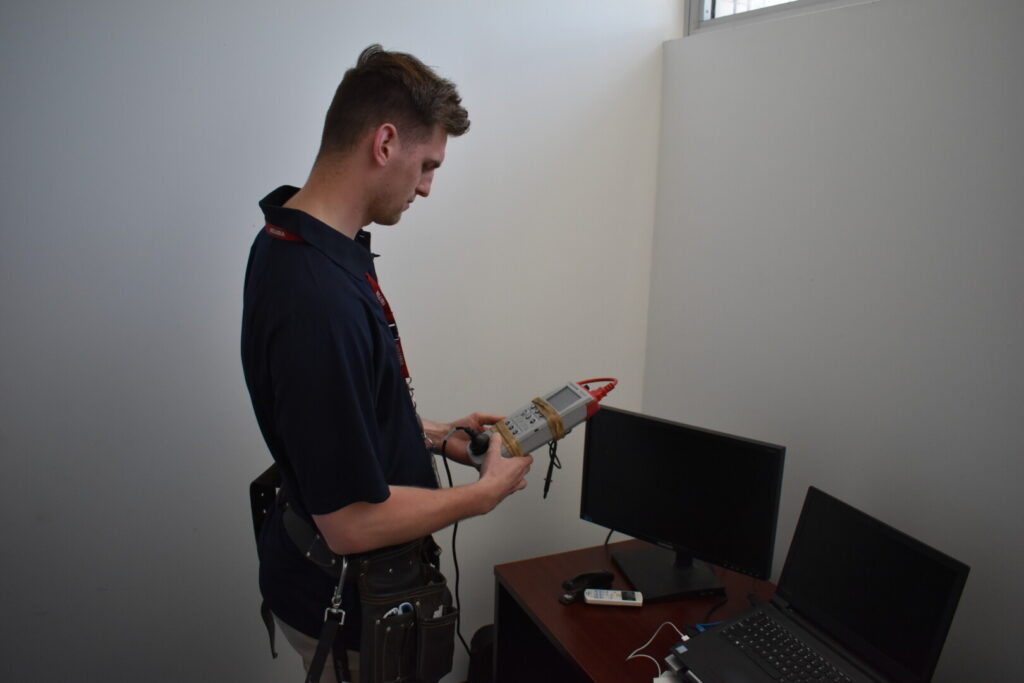Ensuring a safe working environment goes beyond ticking boxes or following procedures on paper. It’s about protecting your team, your clients, and your business assets from preventable risks. One of the most effective and often overlooked ways to achieve this is through regular electrical appliance testing.
Many workplaces conduct testing once and assume they’re covered indefinitely. However, electrical safety is not a “set and forget” task. Appliances wear down with time, environments change, and risks evolve. That’s why retesting isn’t just recommended, it’s a crucial part of maintaining safety standards. If faults go unnoticed, they can result in electric shocks, fires, or equipment failure, which can have devastating consequences for both people and organisations.
Understanding the Purpose of Retesting
What is Electrical Appliance Retesting?
Retesting is the process of inspecting and testing previously certified electrical equipment to ensure it continues to meet safety standards over time. This involves both a visual inspection to check for damage and wear, and electrical tests to detect internal faults that can’t be seen with the naked eye.
Just because an appliance passed inspection six months ago doesn’t mean it’s still safe today. In busy workplaces, appliances can be bumped, dropped, overheated, exposed to water or dust, or even damaged during cleaning or routine use. These small issues often go unnoticed until they result in something serious, unless you catch them during routine retesting.
Why is Retesting So Important?
The importance of electrical appliances testing lies in its ability to prevent injury, equipment failure, legal liability, and business interruption. Electrical appliances that develop faults over time can cause unpredictable outcomes. A frayed cable could spark near flammable materials, a short-circuited tool could shock an employee, or an overloaded extension cord could trigger a fire.
Routine retesting ensures any changes in the appliance’s condition are identified early and dealt with appropriately, saving money, avoiding fines, and potentially saving lives.

AS/NZS 3760: The Standard That Sets the Rules
In Australia, electrical appliances testing is governed by the AS/NZS 3760:2022 standard. This national standard provides clear guidance for how and when in-service electrical equipment must be tested and inspected. It is widely recognised across all industries and is used by electricians, safety officers, and facility managers to ensure compliance and workplace safety.
AS/NZS 3760 covers different equipment types, including Class I (earthed) and Class II (double insulated) appliances, and even Residual Current Devices (RCDs). The standard outlines procedures for both visual inspections and instrument-based testing, ensuring that even hidden faults are uncovered. It also specifies retesting intervals, which are based on how and where the equipment is used.
By following this standard, your business not only improves safety but also stays compliant with Work Health and Safety (WHS) regulations. Non-compliance can lead to fines, loss of insurance cover, and reputational damage so it pays to follow best practice.
Recommended Retesting Intervals (Based on Environment)
The frequency of electrical appliances testing is not the same across all workplaces. It depends largely on the risk level of the environment and how often the equipment is used. Here’s a general guide based on AS/NZS 3760:
| Environment | Type of Equipment | Recommended Retest Interval |
| Construction & Demolition | Power tools, extension leads | Every 3 months |
| Factories & Workshops | Handheld tools, portable appliances | Every 6 months |
| Office Environments | Computers, monitors, printers | Every 12 months |
| Kitchen/Café Areas | Kettles, microwaves, toasters | Every 12 months |
| Schools & Education | General appliances | Every 12 months |
| Hostile Environments | Dusty, damp, or outdoor areas | Every 3–6 months |
High-risk environments, such as construction sites or outdoor worksites, expose equipment to more wear, making frequent testing essential. On the other hand, office settings require testing annually. Even in low-risk settings, regular checks help avoid silent faults and ensure peace of mind.
5 Signs It’s Time to Retest Even If You’re Not Due Yet
1. You’ve Moved or Reinstalled Equipment
Whenever appliances are relocated, unplugged, or reconnected, there’s a risk of damage. Internal wires can shift, plugs can loosen, and cords can be pinched or stretched. Even if you’ve moved an appliance from one side of the room to the other, this simple act can compromise its safety. If your team is rearranging the office, moving equipment between sites, or setting up for an event, it’s worth scheduling an early retest.
2. Visible Damage or Wear
Visible signs like cracked plugs, frayed cords, exposed wiring, or discolouration are obvious indicators that something’s wrong. These hazards are often caused by general wear, rough handling, or even rodents chewing cables. Damaged cables can expose users to live current or short-circuit the appliance. Don’t take chances if it looks off, take it out of use and have it tested immediately.
3. Equipment Feels Hot
If an appliance feels unusually hot to the touch during use or even after it’s been switched off this could indicate an internal fault, poor ventilation, or an electrical overload. Heat build-up inside a device can degrade internal components and increase the risk of fire. Testing can help identify whether the appliance is drawing too much current or if there’s an issue with the wiring or insulation.
4. Tripping Circuit Breakers
If your circuit breakers or RCDs are frequently tripping when a particular appliance is used, that’s a clear warning something isn’t right. It could be a fault in the appliance itself, or it could be drawing more power than the circuit allows. Either way, professional testing is essential to locate the issue before it leads to equipment damage or fire.
5. An Accident or Near Miss
If anyone in your team experiences a mild electric shock, sees sparks when plugging something in, or smells burning plastic, treat it as a serious incident even if there’s no immediate injury. Any appliance involved in such a situation should be removed from use and tested immediately. Safety always comes first.
Who Can Perform Electrical Appliances Testing?
AS/NZS 3760 requires that electrical appliances testing be carried out by a competent person. This doesn’t necessarily mean a licensed electrician, but someone who has completed relevant training and understands how to correctly use test equipment, interpret results, and identify electrical hazards.
Hiring a qualified and experienced provider like the team at Adelaide Test and Tagging gives you confidence that your equipment is tested properly and documented in accordance with Australian standards. They also help you maintain a clear testing schedule, minimising the risk of overdue inspections.
The Benefits of Staying on Top of Retesting
Staying proactive with your electrical appliance retesting has multiple long-term benefits:
- Improved safety for employees, customers, and visitors
- Reduced risk of electrical fires, faults, and injuries
- Compliance with WHS regulations and insurance requirements
- Accurate record-keeping for audits and inspections
- Longer lifespan for appliances through early fault detection
- Minimised downtime by addressing problems before failure occurs
Retesting may seem like a small detail, but it can have a huge impact on your organisation’s safety culture and operational reliability.
Ensure Safety and Compliance with Regular Appliance RetestingFinal Thoughts
Electrical appliances can make our lives easier, but only when they function safely and reliably. Without regular electrical appliances testing, even the most trusted tools can become dangerous over time. Whether you’re running a school, a construction site, a café, or an office, knowing when to retest is critical to maintaining a safe and compliant environment.
If you haven’t reviewed your testing schedule in a while, or if you’ve spotted any warning signs, now is the perfect time to act.
Stay Safe. Stay Compliant. Stay Ahead.
Let Adelaide Test and Tagging help you take the guesswork out of electrical safety. Their expert team provides reliable, professional, and fully certified electrical appliances testing services across Adelaide and surrounding areas.


